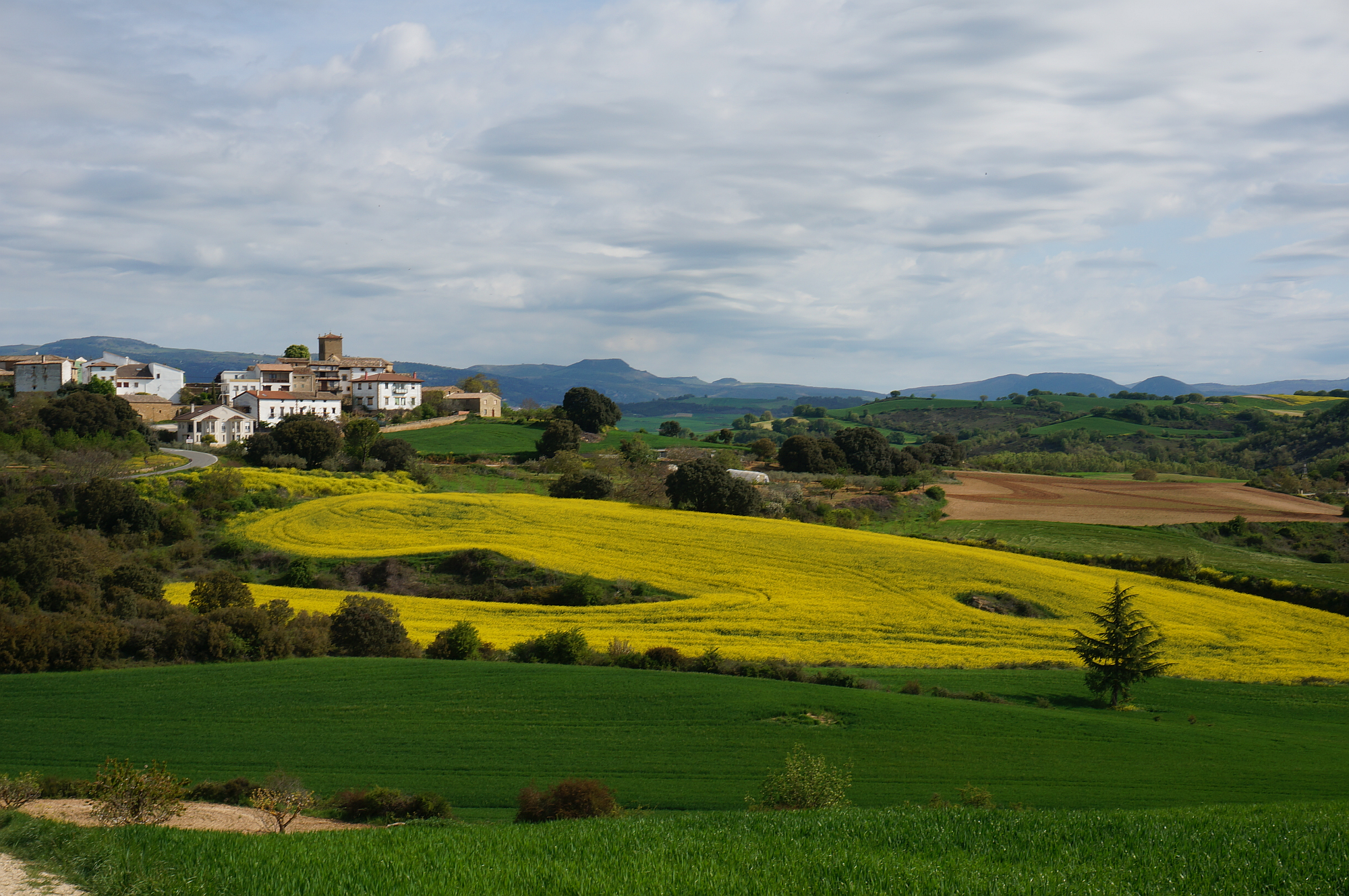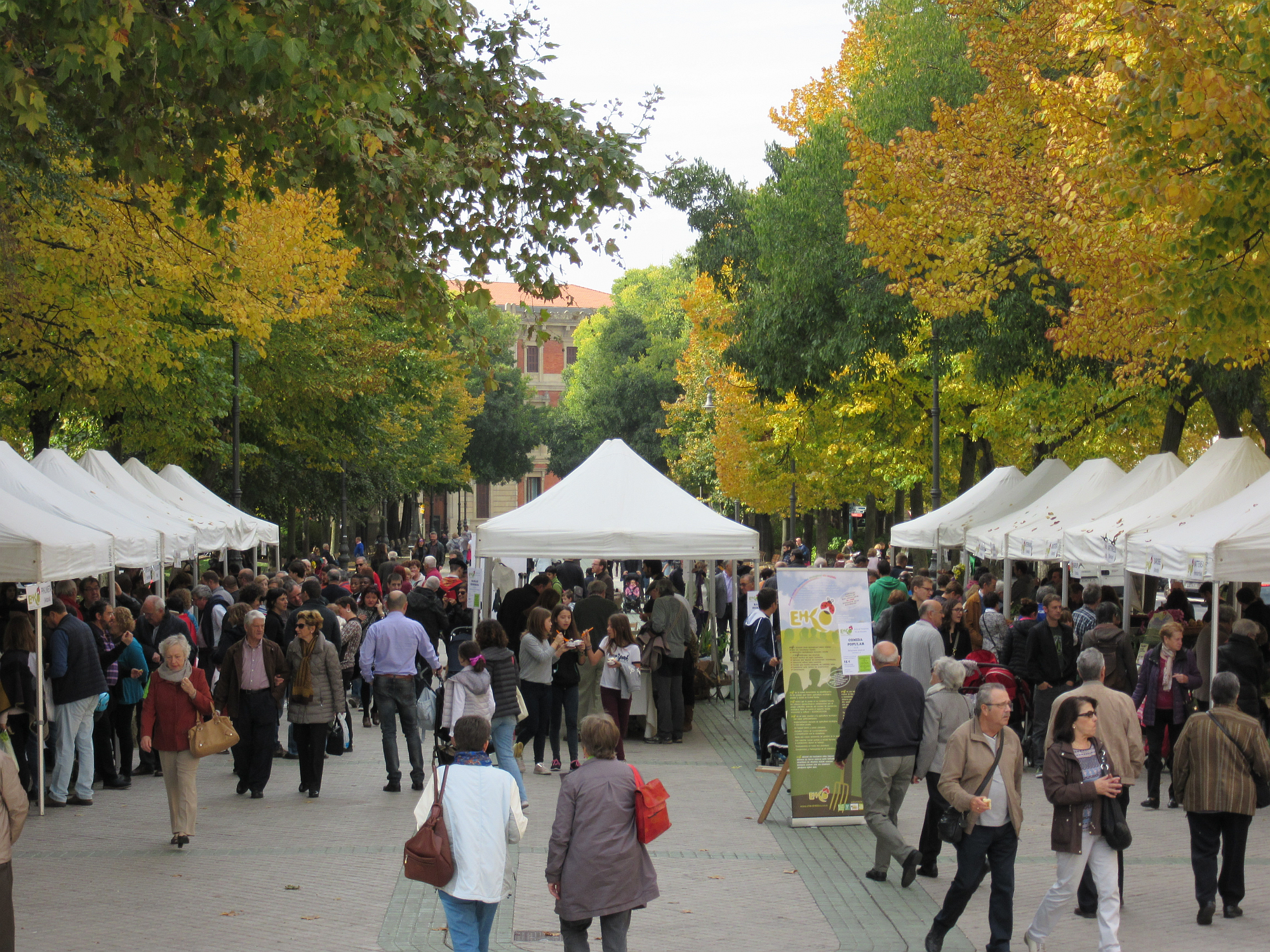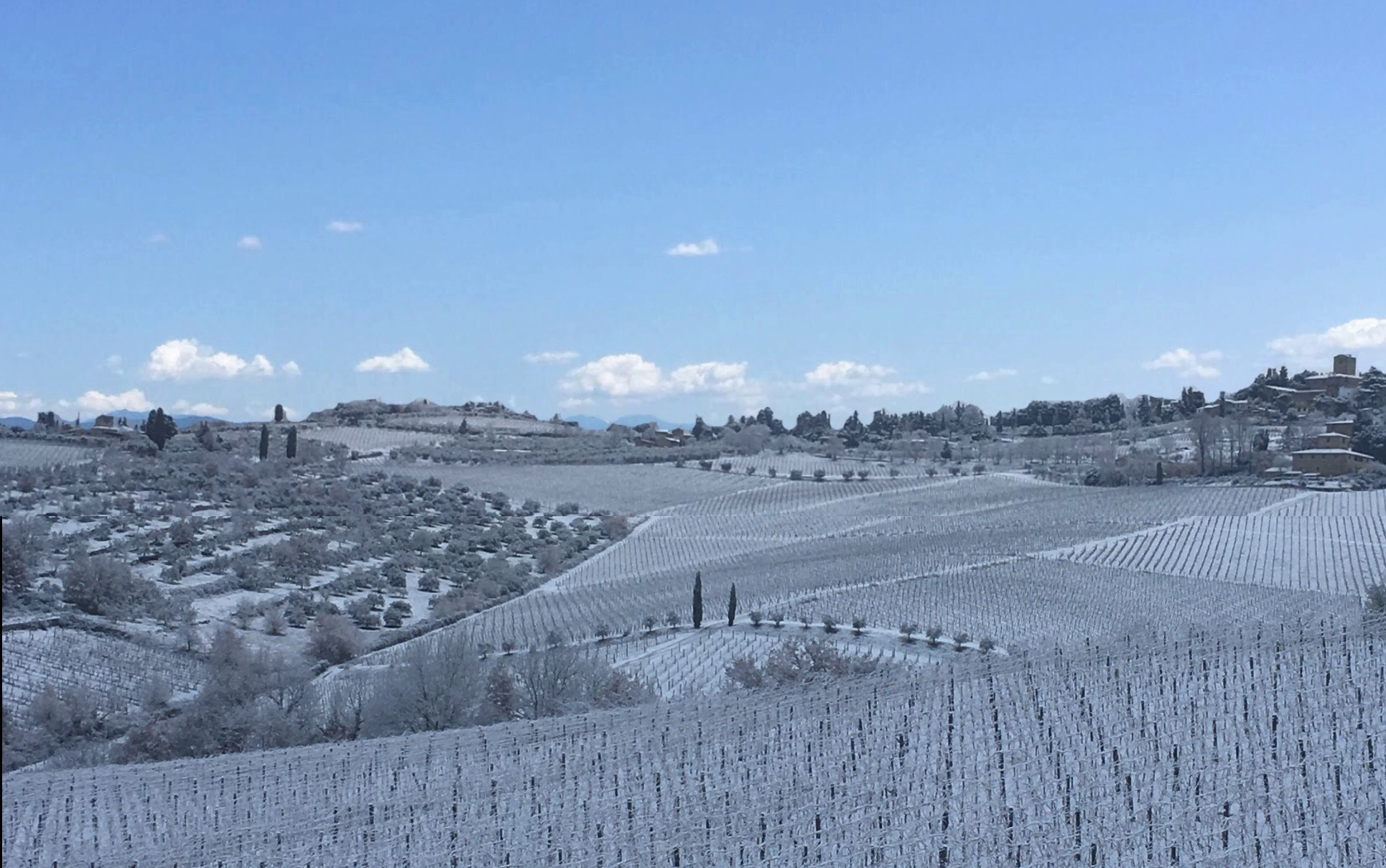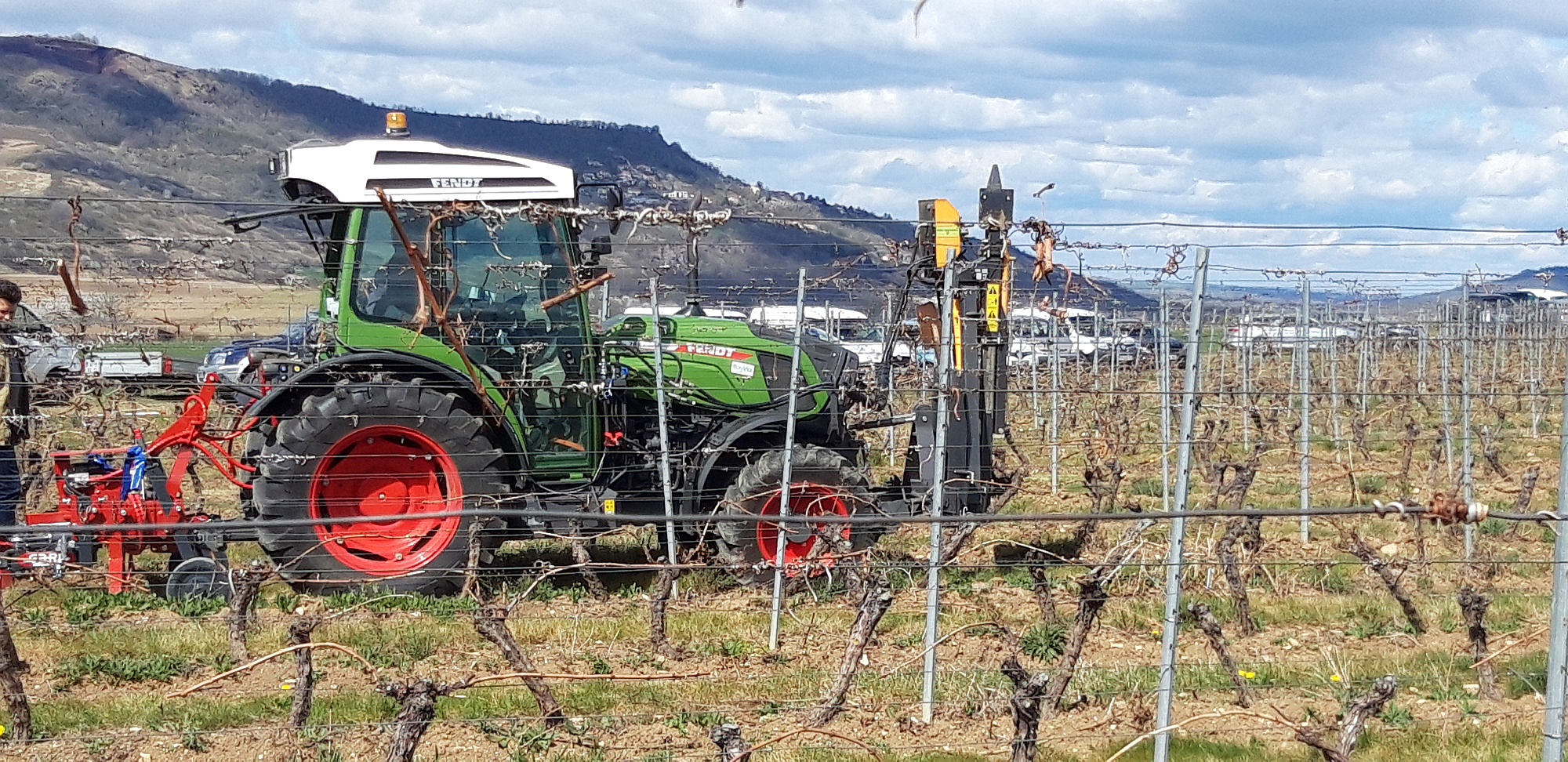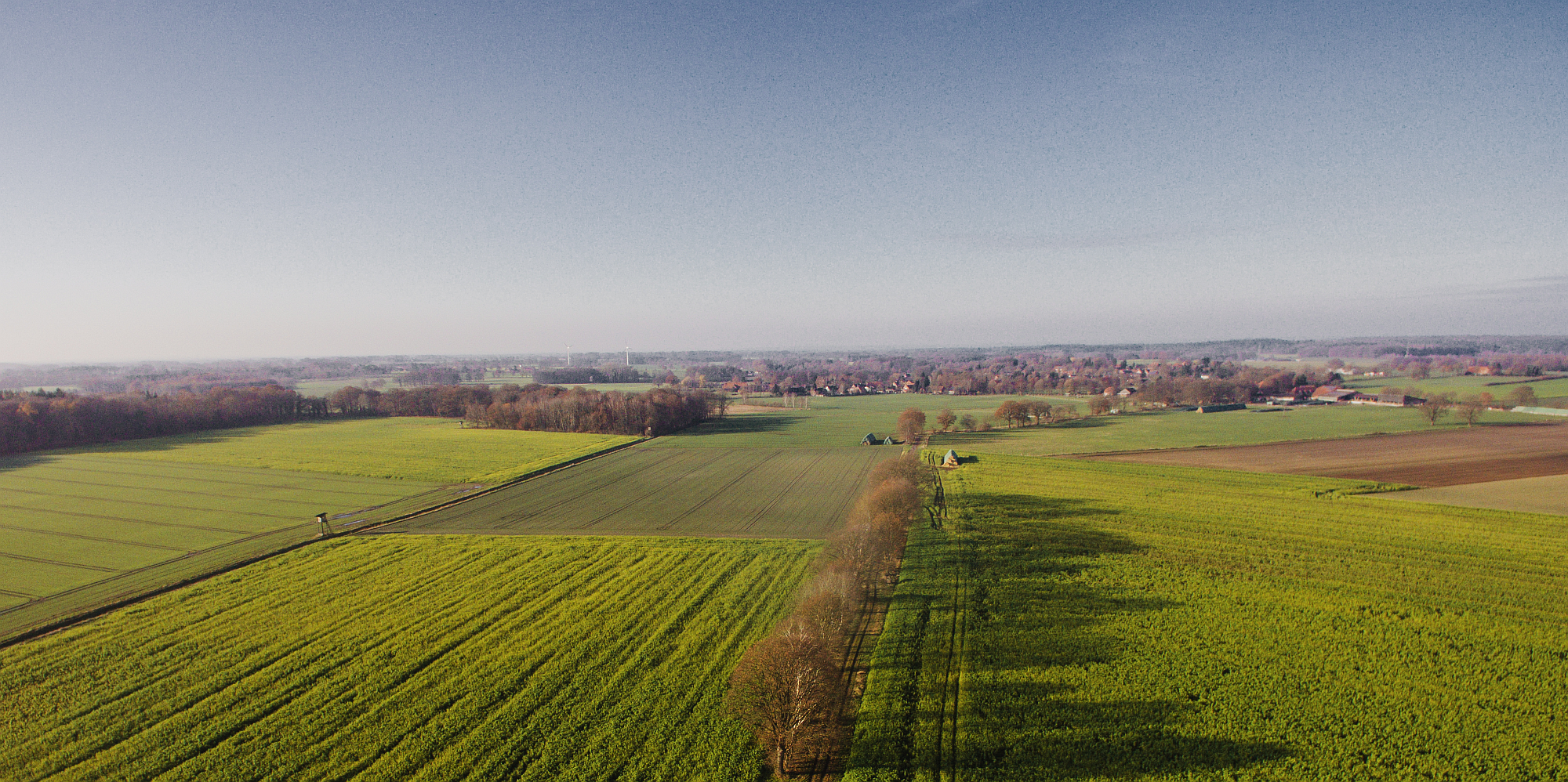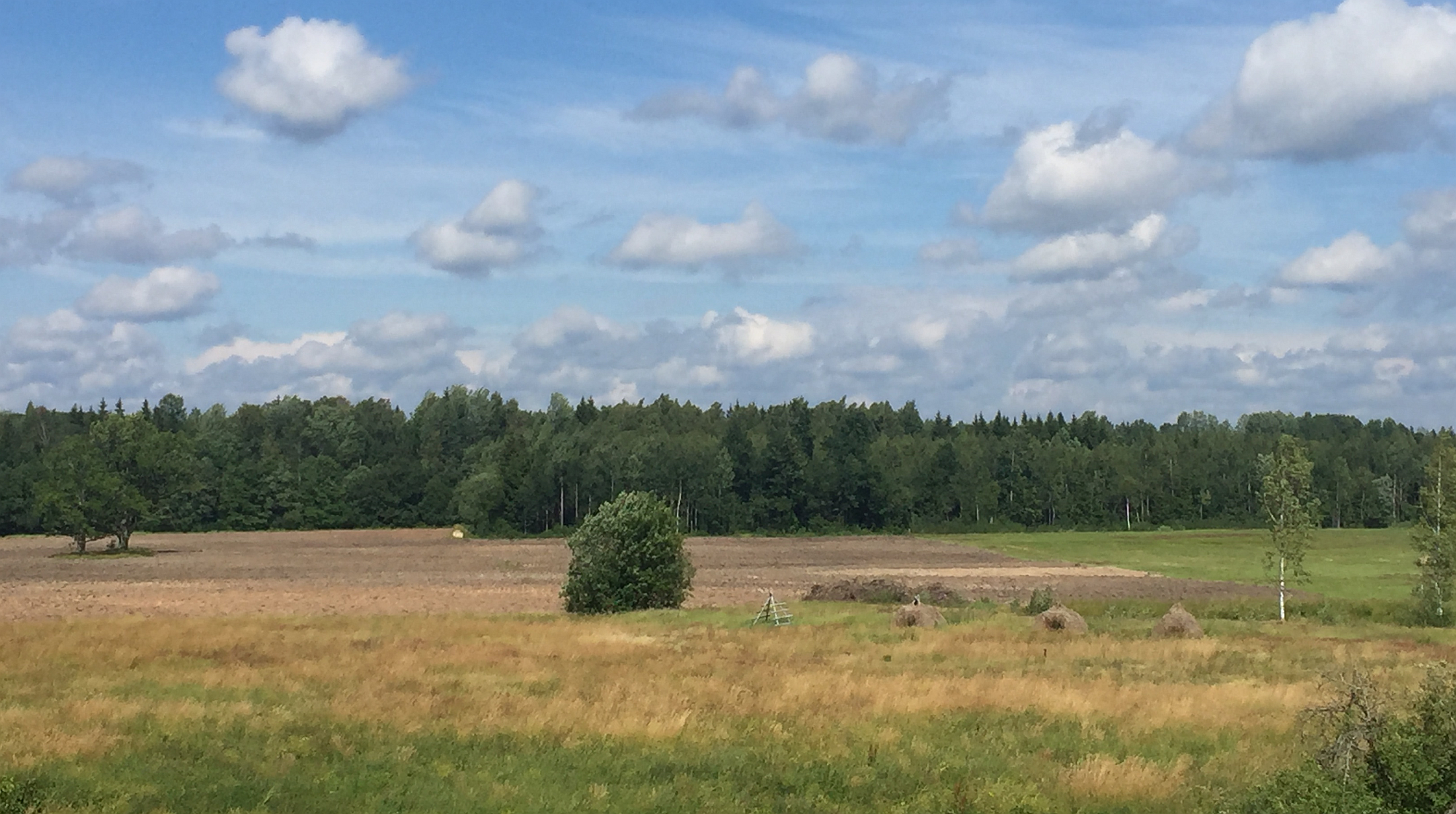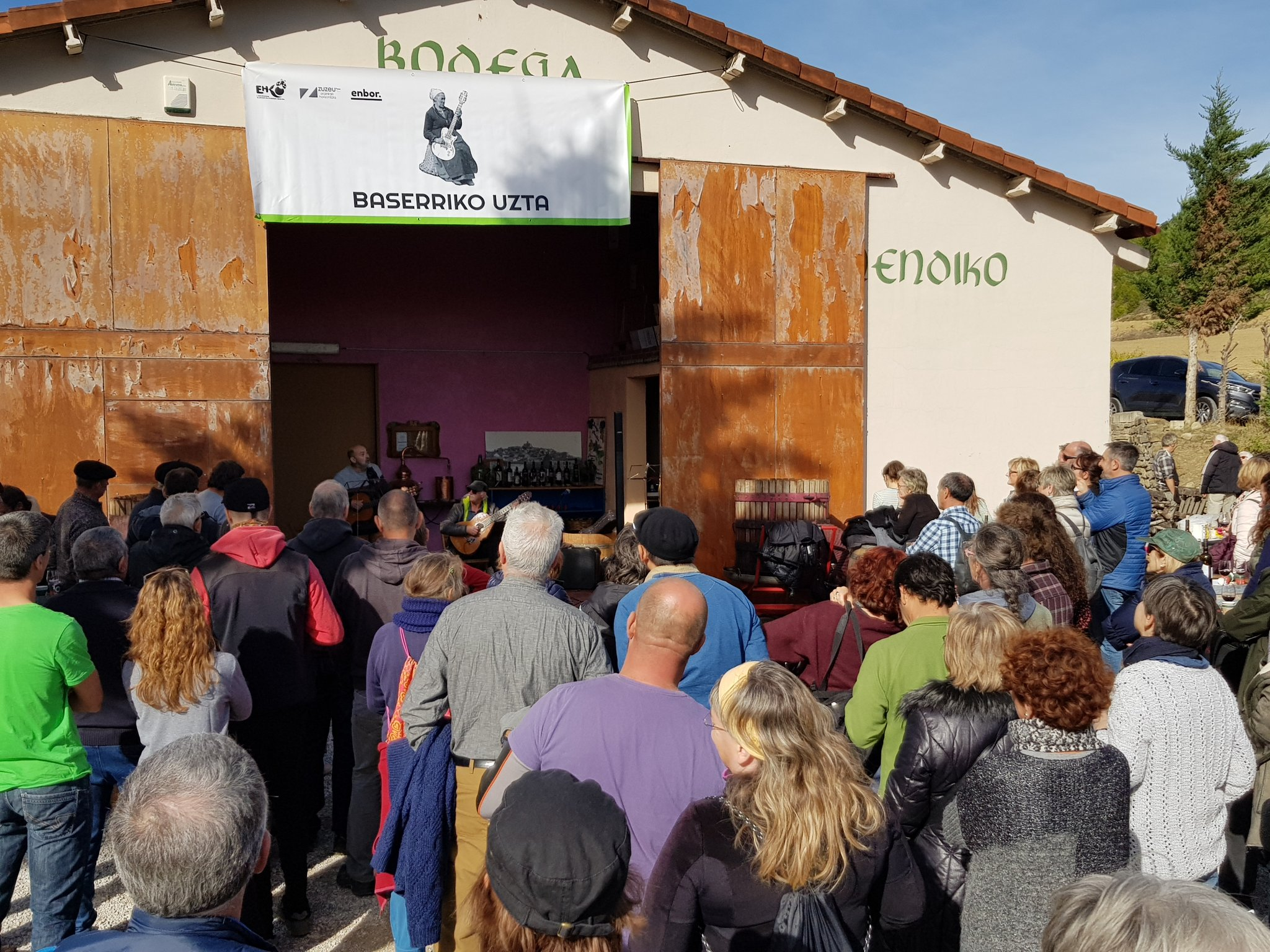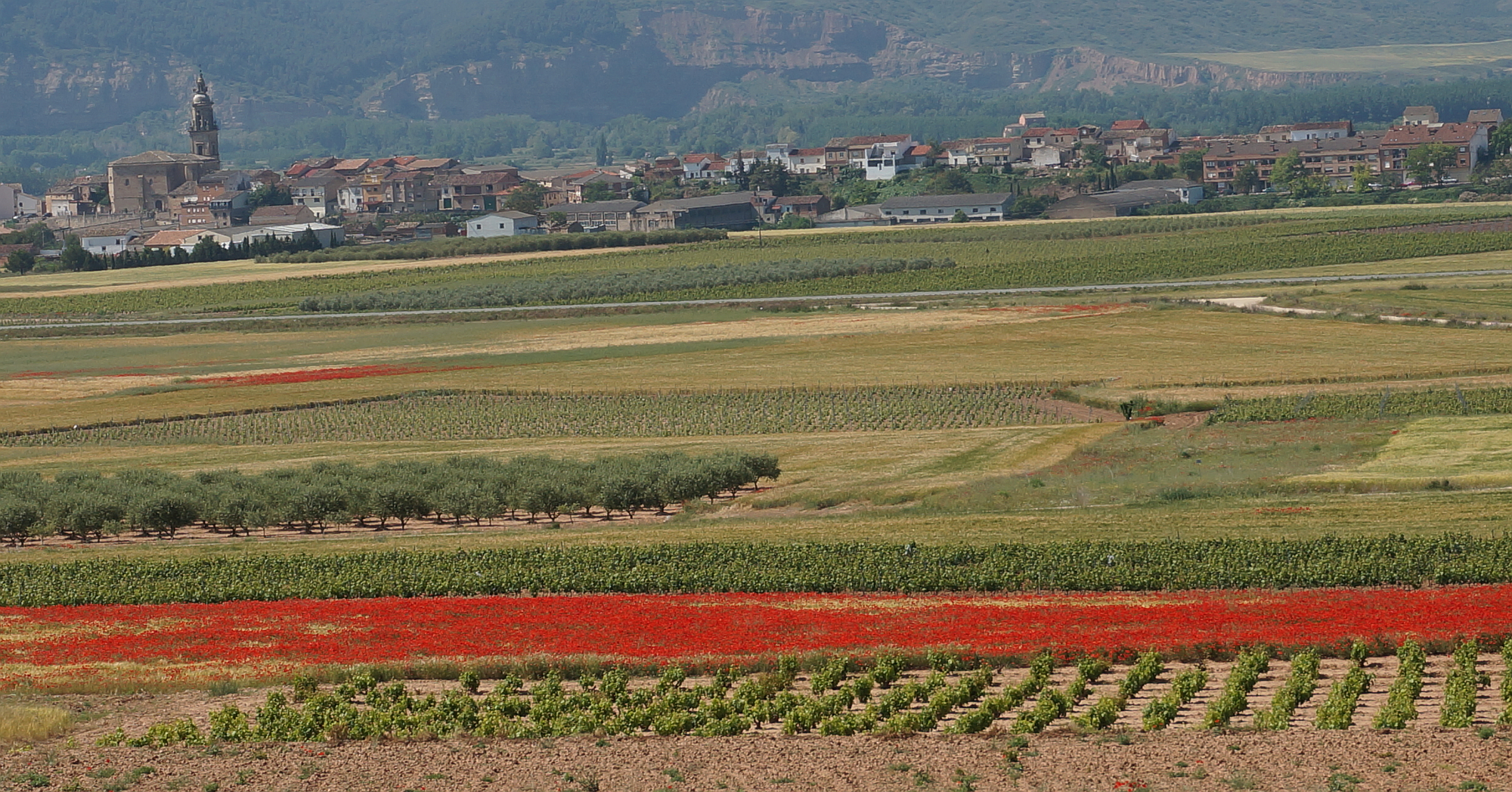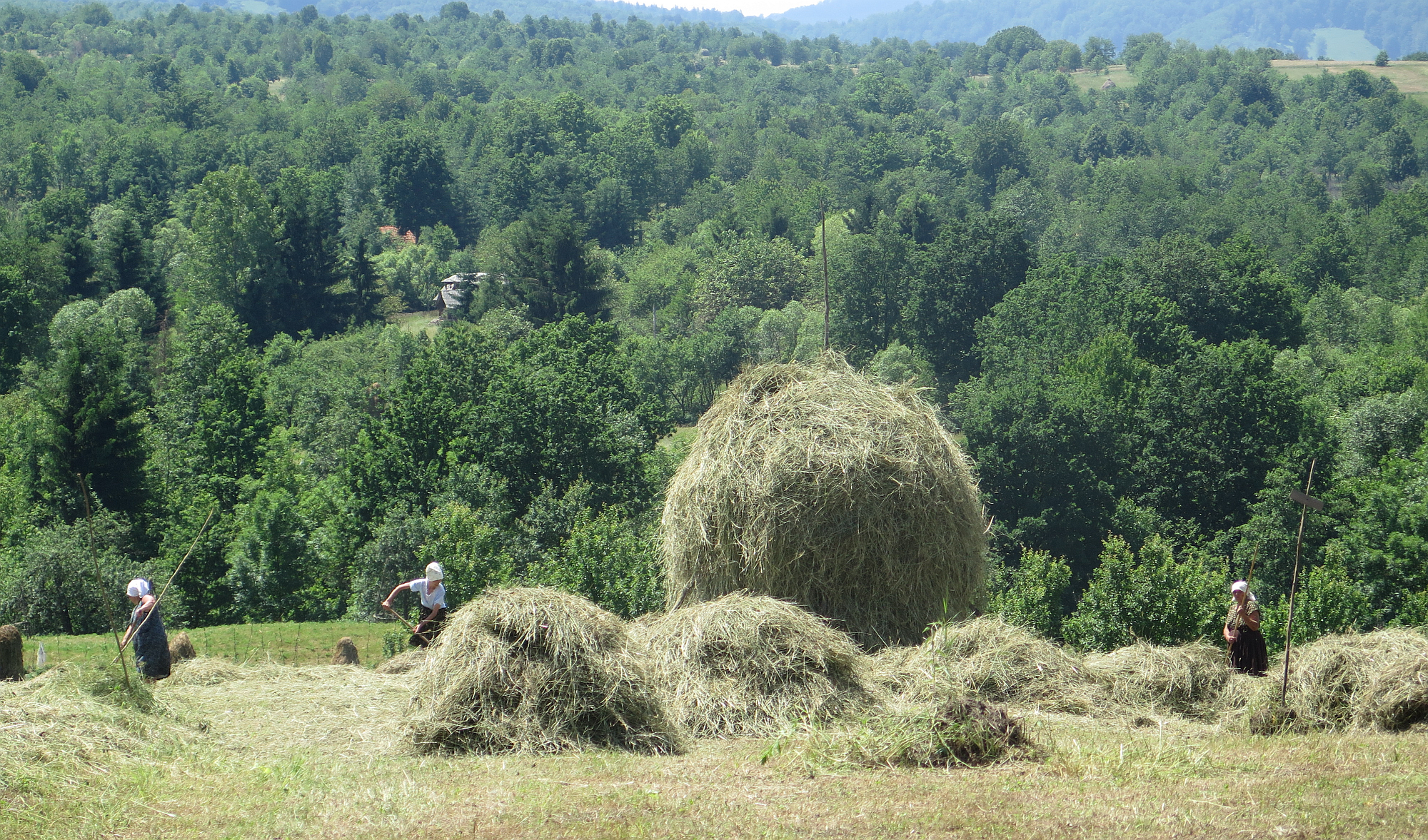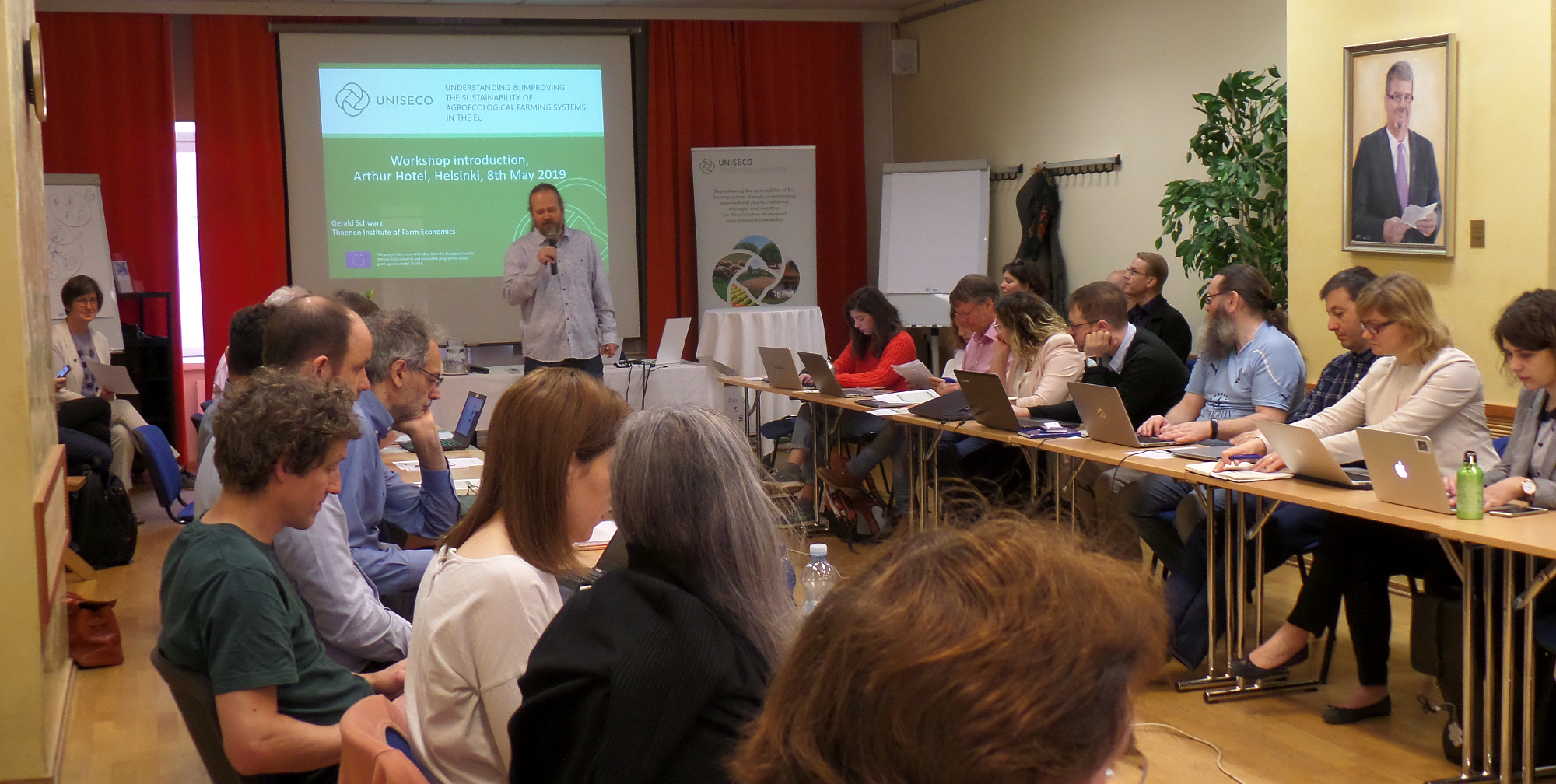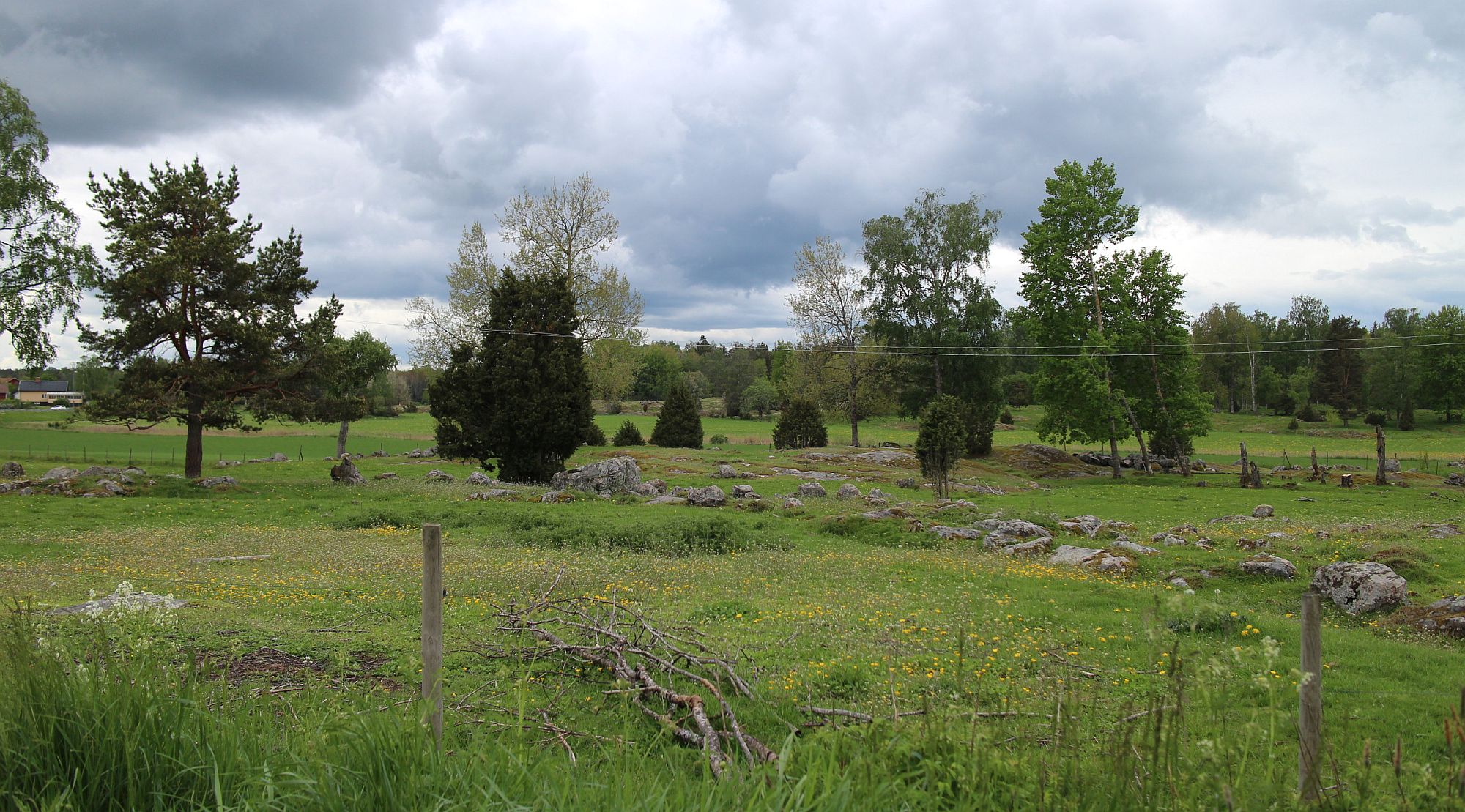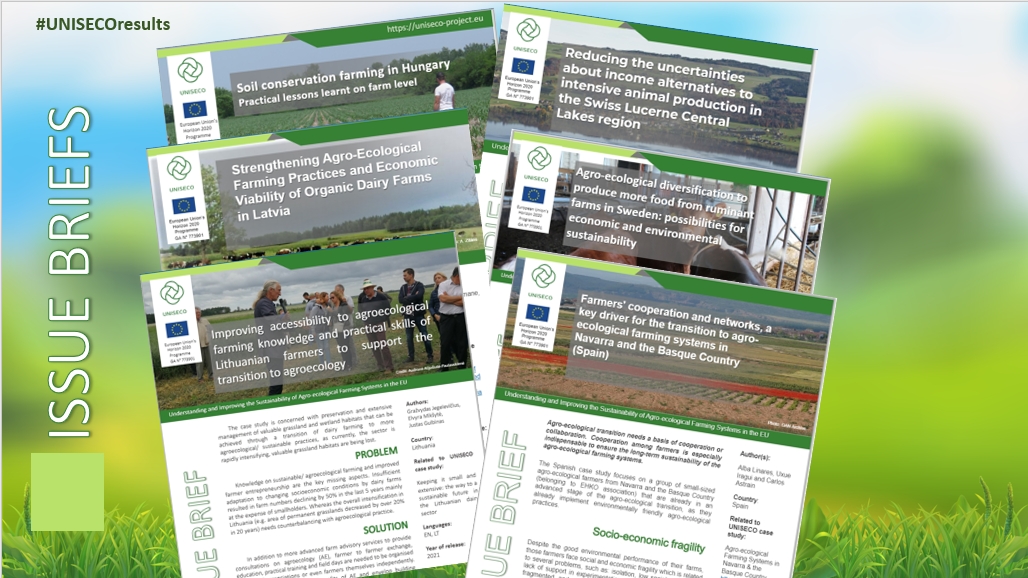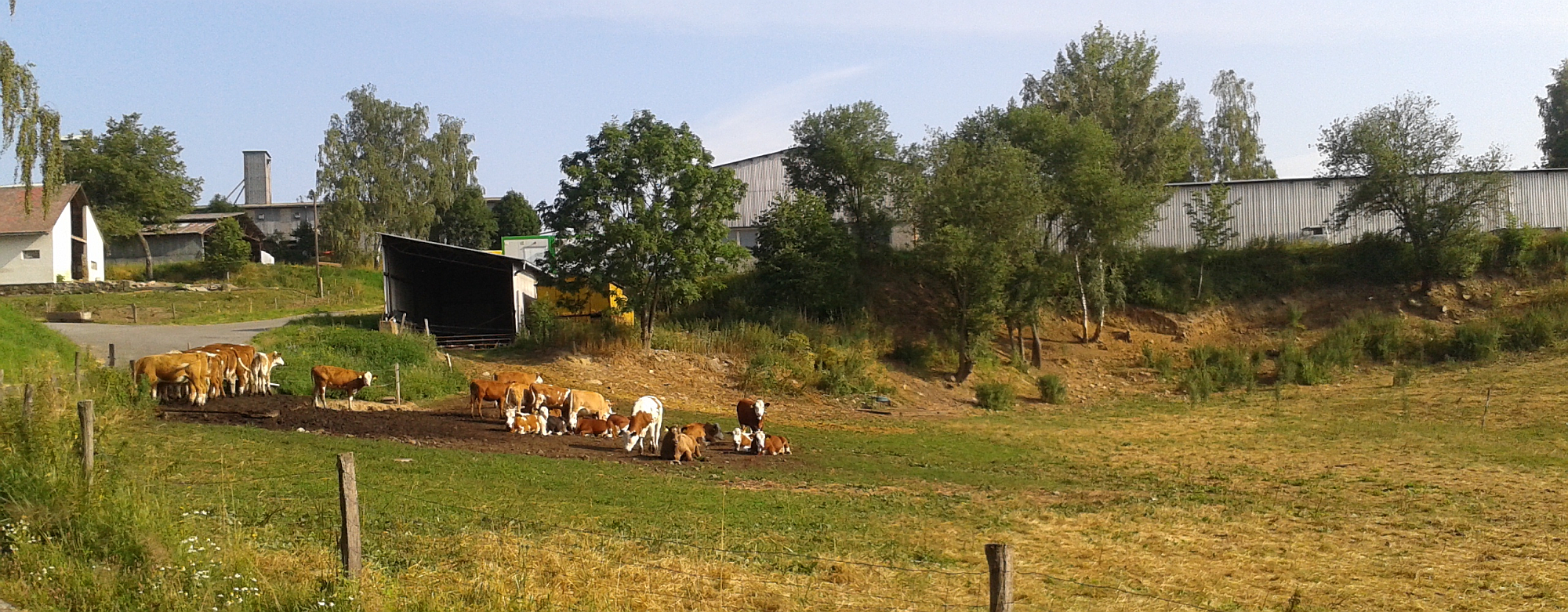Tools and results from UNISECO
Socio-ecological systems framework for agro-ecological transitions
Definition of agro-ecology and typology of agro-ecological farming systems
Strategies for agro-ecological transitions
Networks of actors in agro-ecological transitions
Territorial sustainability impacts of agro-ecological transitions
Transdisciplinary Multi-actor platforms
Tools from UNISECO
4) SESSIT: explore the sustainability of agro-ecological practices in maps
In this page we introduce the tools and results from the H2020 project UNISECO: Understanding and improving the sustainability of Agro-ecological Farming Systems in the European Union, which aimed at analysing socio-economic and policy drivers and barriers for the further development and adoption of agro-ecological approaches in farming systems.
In this project we carried out multi-actor transdisciplinary case study analyses in 15 European countries covering various farming systems where initiatives are either already in place, or are initiated by the project to foster the development of agro-ecological practices and improve the sustainability of farming systems.
We showcase the results of the UNISECO project, including the governance of agro-ecological transitions and sustainability implications at farm and territorial level in the EU. Learn about the methodologies and tools we used and adapted in UNISECO specifically for the analysis of agro-ecological farming systems, related governance systems, including the socio-ecological systems (SES) framework, building a typology for agro-ecological farming systems, using social network analysis, multi-criteria analysis, foresight exercise and scenario analysis, transdisciplinary approach, socio-ecological system interaction tool to study holistically the multi-facetted dimensions of farming systems transition towards agroecology, be they technical, environmental, social, economic or political.
The UNISECO project has provided:
- improved methodological capacity to assess the sustainability of agro-ecological approaches;
- enhanced integrated capacity and knowledge sharing to develop viable long-term strategies for traditional and small-scale agro-ecological farming systems;
- co-constructed novel and effective market mechanisms and policy instruments for delivering public goods through economically viable agro-ecological farming systems;
- improved knowledge base of agro-ecological farming in the EU for use by policy-makers with at EU, national and regional levels, advisors, farmers, value chain actors and consumers;
- informed the reform process of the CAP after 2020, revisions to environmental policies and policy efforts to support rural job creation.
Socio-ecological systems framework for agro-ecological transitions
To analyse the transition of farming systems, in UNISECO we adapted the theoretical framework of socio-ecological systems (SES) developed by Ostrom. This framework provides a holistic approach to integrating both the natural and the social aspects when analysing a complex situation or problem. In the context of UNISECO, it allows the integration of the various dimensions of farming systems transition towards agroecology, be they technical, environmental, social, economic or political.
Read our related report:
- D2.1 - Adapted SES Framework for AEFS and Guidelines for Assessing Sustainability of Agricultural Systems in Europe (link to Zenodo)
Definition of agro-ecology and typology of agro-ecological farming systems
Agroecology is defined as a practice, a social movement as well as an action science based on holistic and transdisciplinary research approach. In the assessment of farming systems in UNISECO, we refer to agroecology as a set of agricultural practices, more or less, strongly based on ecological inputs and processes organized in a holistic way. In such farming systems farmers use their knowledge and decision priorities for sustainable use of local renewable resources and biodiversity to provide multiple benefits (environmental, economic, social) from local to global. This refers to different interacting scales, not only the level of agricultural practices but also farming system, local community and food system levels.
In UNISECO we developed a typology of agro-ecological farming systems and practices encompassing different implementation scales of such practices namely the field level, the farming system level and the landscape level. This allows the consideration of practices of farming systems respect to field, farming systems and landscape levels. To assess farming systems as a socio-ecological system we propose to develop a multi-dimensional approach including existing markets, level of cooperation, role of policies in supporting agro-ecological practices, policy tools and key actors.
In UNISECO we studied a broad pool of farming systems at different stages of agro-ecological transitions in Europe. The farming systems were selected to reflect 1) the diversity of farming systems across the EU; 2) the types of agri-food systems and policy context in which the farming systems are embedded; 3) the types of agro-ecological practices which have been implemented.
Read our related report:
The UNISECO case studies
All the 15 UNISECO Case Studies contain a key dilemma associated with the transition to agro-ecological farming systems. The dilemmas identified are mainly related to the trade-off between the different dimensions of sustainability that are challenging the agro-ecological farming systems. Two different types of case studies have been included in the analysis of the different SES:
- network-based case: that refer to large area at regional or national levels, and
- place-based case: local case studies with specific geographical boundaries.
Amongst the 15 case studies carried out in the context of UNISECO, there are 11 network-based Case Studies and 4 place-based Case Studies. The Case Studies cover different scopes:
- 4 Case Studies have a country scope which look at the soil conservation farming (HU), at the dairy supply chain (LV and LT) and at the sustainability performance of the national livestock sector (SE);
- 6 Case Studies have a subnational or regional focus, where several agro-ecological issues have been analysed related to dairy sector (CZ), permanent crops (FR and GR) and mixed farming systems (RO, ES and UK);
- 5 Case Studies have a local scope: on arable and livestock farming (AT), on dairy (FI), arable (DE), permanent crops (IT) and livestock farming systems (CH).
EXPLORE THE DETAILS OF OUR CASE STUDIES BY CLICKING ON THE RESPECTIVE PARTS OF THE OVERVIEW MAP AT THE BOTTOM OF THIS PAGE.
View the video recordings of presentations of case studies at the final conference (in English):
- Lessons and insights from conventional and organic dairy systems
- Initiating transitions in intensive arable and livestock systems
- Lessons and insights from Mediterranean perennial systems
- Lessons and insights from mixed farming systems
Read our open access article:
Read our related reports:
- D3.1 - Report on Environmental Economic and Social Performance of Current AEFS (link to Zenodo)
- D3.2 - Database on the Performance of Current AEFS (link to Zenodo)
View the Methodological briefs:
These briefs offer actors from science, practice and policy guidelines for applying different methodologies (e.g. a multi-criteria analysis of policy incentives promoting agro-ecological transitions) when developing strategies for agro-ecological transitions in co-constructive settings.
- UNISECO H2020 methodological brief: Setting up a transdisciplinary framework: Brief Step-by-Step Guide
- UNISECO H2020 methodological brief: Data collection for assessing social-ecological systems (SES): Brief Step-by-Step Guide
- UNISECO H2020 methodological brief: Decision support tools (DST): Brief Step-by-Step Guide
- UNISECO H2020 methodological brief: Social Network Analysis: Brief Step-by-Step Guide
- UNISECO H2020 methodological brief: Multi-Criteria Analysis of Market and Policy Instruments: Brief Step-by-Step Guide + UNISECO-MCA-tool-assessment-matrix-MPIs_2020_CC.xls
- UNISECO H2020 methodological brief: Monitoring and evaluating Multi-Actor Platforms: Brief Step-by-Step Guide
Strategies for agro-ecological transitions
The assessments of the social-ecological systems in the case studies Identified a wide range of barriers that hinder the implementation of agro-ecological practices. The focus of the UNISECO project was on socio-economic and policy factors and three broader main themes of barriers and drivers which were identified:
- a lack of knowledge and social capital;
- the lack of added value, processing and market access;
- ineffective policy design.
Specific attention was paid to the complexity of the relationships between different factors which could impact on the success or failure to initiate or enhance transitions, and inform the types of key actions and changes in governance required in future transition strategies.
Key aspects for successful agro-ecological transitions are improved knowledge on the benefits of agro-ecological practices and economic opportunities, the importance of education, training and life-long learning, and mature social capital and strengthened collaborative action and collective institutions in agro-ecological value chains. This would enable higher prices to be charged for agro-ecological products and utilise the potential of agro-ecological farming to be economically viable. Such processes need to be supported by policy and the public sector, to address issues of economic exploitation and power relations as well as problems of over-consumption and food waste in food chains, with implications for public health, social justice and food security.
We provide all the details of the analysis of barriers and drivers that hinder or facilitate the implementation of agro-ecological practices, and the strategies identified that address the barriers and drivers of agro-ecological transitions in the context of the 15 UNISECO case studies.
Read our related report:
Networks of actors in agro-ecological transitions
One of the key aspects developed in the socio-ecological systems framework is the analysis of the social system. It is composed of two sub-systems: the network of actors involved and the governance systems that influence the actions undertaken by the actors.
Learn more about how we used the Social Network Analysis to have an overview of the actors and of their links and for analysing the governance structures of the transition patterns towards agroecology. In each Case Study governance structures are analysed by mapping and analysing networks involved in a specific key agro-ecological dilemma.
Governance is defined as “the structures and processes by which people in societies make decisions and share power, creating the conditions for ordered rule and collective action, or institutions of social coordination” (Schultz et al., 2015).
The FAO (2018) highlight the need, in particular, for transparent, accountable and inclusive governance mechanisms to create an enabling environment that supports producers to transform their systems following agro-ecological concepts and practices.
In the 15 UNISECO case studies we explored the key institutional settings beyond the agro-ecological dilemmas, with particular attention paid towards actors, actions, rules and collective organisations that could enable agro-ecological transitions. The main evidence collected through this task shows that each agro-ecological dilemma involves a complex mix of different, and often conflicting, views and interests. Mapping the key ‘nodes’ and ’flows’ of each network can provide important insights on how to improve the communication and other types of exchanges between actors and on how to develop common strategies and to solve key conflicts.
Read our related report:
- D5.2 - Governance
Networks Supporting AEFS (link to Zenodo)
- D5.2 - Annex: Case studies (link to Zenodo)
Market and policy incentives
In the context of UNISECO, particular attention is paid to the transition of EU agriculture towards agro-ecological practices, where such transition takes place on a continuum of ecological modernisation between two extremes of efficiency/substitution-based agriculture and biodiversity-based agriculture (Duru et al., 2015). Since UNISECO focuses on the transition processes affecting the whole continuum, from conventional to agro-ecological (food) systems, a broad range of policy and market incentives were considered, implemented at international level (EU & non-EU), national level, and at regional & local levels.
We compiled an up-to-date inventory of innovative market and policy incentives that aim to increase the productivity, delivery of public goods and job creation, and which are relevant for agro-ecological farming. The overall objective of the inventory was to identify and classify key examples of market and policy tools that have the greater potential to support the transition processes towards agro-ecological farming systems.
Read our related report:
- D5.1 - Inventory of Market and Policy Incentives Supporting AEFS (link to Zenodo)
We also reviewed and analysed the market and policy incentives that are supporting Agroecological Farming Systems, to identify and understand policy factors that enhance or limit agroecological transition in the UNISECO case studies. Market and policy incentives refer to any initiative, mechanism, measure or incentive of the government (policy instrument), private sector (market instrument), or both (mixed instrument), with the aim of supporting, to some extent, the agro-ecological transition.
Research findings highlighted that the existing MPIs such as agri-environmental schemes and support for advisory services have positive effects on the decisions of farmers to adopt more ecological practices and motivate farmers to initiate or continue the transition. Key positive factors identified were: the provision of economic stability and technical and financial support to farmers willing to experiment with new sustainable practices; promotion of collective actions and understanding amongst local actors; production and spread of new knowledge; design od tools and activities that highlight the roles of agriculture in the environment.
Read our related reports:
- D5.3 - Report on participatory analysis of market and policy instruments for agro-ecological transition (pdf)
- D5.4 - Report on innovative market incentives and policy instruments favouring conversion pathways to AEFS (pdf)
Territorial sustainability impacts of agro-ecological transitions
The UNISECO project’s recommendations on how the sustainability of agro-ecological farming systems in Europe can be promoted, also build upon model-based assessments of agro-ecological transition scenarios at territorial level. The scenarios analyse the large-scale implementation of selected innovative agro-ecological practices from the case studies within different future food system contexts in the EU.
Read our related reports:
- D4.1 - Report on methodological specification of the spatially-explicit modelling framework(pdf)
- D4.2 - Report on Participatory Scenario Development of Agro-ecological Farming Systems(pdf)
- D4.3 - Territorial Impacts and Lessons Learnt of the Diffusion of AEFS in the EU(pdf)
Read the UNISECO related open access article:
- Food systems in a zero-deforestation world: Dietary change is more important than intensification for climate targets in 2050 - Science of the Total Environment Vol 735 2020
Watch the video of the presentation recorded at the final conference on territorial impact of agro-ecological farming practices and food systems transformation in the EU in 2050:
Science-policy interaction
If the overall objective of agro-ecological farming systems is achieving a system re-design based on agro-ecological principles, it is clear that the technical improvement of farming practices is not sufficient. Such a re-design requires collective thinking, the involvement of new actors and different forms of coordination between stakeholders.
Science and innovation are at the heart of not only advancing knowledge, know-how and technology development of agro-ecological transitions. We learnt from the UNISECO Case Studies that research, innovation and advisory actors also have a central role as mediators in the science-policy-practice interface.
The UNISECO project results are intended to contribute to the implementation of the EU Farm to Fork Strategy, Biodiversity Strategy for 2030, the preparations of the European R&I partnership on agroecology living labs and research infrastructures, and the national CAP Strategic Plans.
View the video on how UNISECO contributes to the Farm to Fork Strategy of the European Union.
We involved many policy stakeholders in our transdisciplinary Multi-actor Platforms {LINK TO TRANDISCIPLINARY MAPS} during the exchanges in workshops and focus group discussions at EU, national and local levels.
View the series of short clips “We asked policy stakeholders…. “
- What are the expectations of the European Commission towards the UNISECO H2020 project?
- What are the opportunities for UNISECO with respect to needs for implementing aspects of the Common Agricultural Policy?
Read the UNISECO related open access articles:
- Policies for agroecology in Europe, building on experiences in France, Germany and the United Kingdom -Journal of Sustainable and Organic Agricultural Systems Vol 70 (2) 2020
- Food systems in a zero-deforestation world: Dietary change is more important than intensification for climate targets in 2050Science of the Total Environment Vol 735 2020
Read our policy briefs:
UNISECO has also produced a series of recommendations for policy makers to identify issues and promote good practices.
Austria
- UNISECO H2020 policy brief: Mitigation of climate change by humus formation and regenerative arable farming in Eastern Austria
- UNISECO H2020 policy brief: Eindämmung des Klimawandels durch Humusaufbau und regenerativen Ackerbau in Ostösterreich
Czech Republic
- UNISECO H2020 policy brief: Improving soil properties on arable land by maintaining organic dairy farming in the Vysočina region
- UNISECO H2020 policy brief: Zlepšení půdních vlastností orné půdy udržením ekologického hospodaření mléčných farem na Vysočině
Finland
- UNISECO H2020 policy brief: The profitability of biogas investments remains an obstacle to achieving the carbon neutrality objectives of the dairy value chain
- UNISECO H2020 policy brief: Biokaasuinvestointien kannattavuus edelleen este maitoketjun hiilineutraaliustavoitteiden toteutumiselle
France
- UNISECO H2020 policy brief: Viticulture and agroecology (France). Cooperation between farmers to foster agroecological practices in viticulture
- UNISECO H2020 policy brief: Viticulture et agro-écologie (France). Coopération entre exploitants viticoles pour promouvoir les pratiques agro-écologiques en viticultre
Germany
- UNISECO H2020 policy brief: Supporting knowledge networks for sustainable farming practices in Lower Saxony
- UNISECO H2020 policy brief: Förderung von Wissensnetzwerken für eine nachhaltige Landwirtschaft in Niedersachsen
Greece
- UNISECO H2020 policy brief: The role of collective efforts in fostering agro-ecological transition in Imathia, Northern Greece
- UNISECO H2020 policy brief: Η συμβολή των συλλογικών προσπαθειών στην προώθηση της μετάβασης προς την αγρο-οικολογία στην Ημαθία
Hungary
- UNISECO H2020 policy brief: Soil conservation farming in Hungary: How policies could be improved to assist agro-ecological transition?
- UNISECO H2020 policy brief: Szakpolitikai ajánlás: Talajkímélő gazdálkodás Magyarországon Miként lehet segíteni a szakpolitikák javításán keresztül az agro-ökológia felé történő elmozdulást?
Italy
- UNISECO H2020 policy brief: Innovative policy tools and grassroots initiatives to foster the agroecological transition of a market-oriented winegrowing area (Chianti, Italy)
- UNISECO H2020 policy brief: Strumenti politici innovativi ed iniziative locali per favorire la transizione agroecologica di un'area vitivinicola orientata al mercato (Chianti, Italia)
Latvia
- UNISECO H2020 policy brief: Differentiation of support for organic farming based on the complexity of agro-ecological farming practices and performance of agro-environmental measures in Latvia
- UNISECO H2020 policy brief: Policies Enabling Transition to Organic Dairy Farming Systems in Latvia
- UNISECO H2020 Policy brief: Atbalsta pasākumu diferencēšana bioloģiskajai lauksaimniecībai Latvijā
- UNISECO H2020 Policy brief: Politikas atbalsts pārejai uz bioloģiskās piena lopkopības sistēmu Latvijā
Lithuania
- UNISECO H2020 policy brief: Small family dairy farms - from status quo to agroecological farming systems?
- UNISECO H2020 Politikos santrauka: Smulkių pieno ūkių ateitis – agroekologinių ūkininkavimo sistemų link?
Romania
Spain
- UNISECO H2020 policy brief: Supporting the development of an agro-ecological market through Measure 16.2 of the Rural Development Program (RDP) in Navarra
- UNISECO H2020 policy brief: Apoyar el desarrollo del mercado agroecológico en Navarra (España) a través de la Medida 16.2 del Programa de Desarrollo Rural (PDR)
Sweden
Switzerland
- UNISECO H2020 policy brief: Increasing the knowledge about income alternatives to intensive livestock farming of the Swiss Lucerne Central Lakes region
- UNISECO H2020 policy brief: Verbesserung der Kenntnisse über Einkommensalternativen zur intensiven Nutztierhaltung in der Region Luzerner Mittellandseen
United Kingdom
- UNISECO H2020 policy brief: Addressing barriers of culture, mindset and institutions through effective co-creation forums and networking, in North-east Scotland, UK
- UNISECO H2020 policy brief: Tackling the shortage of skilled and informed labour to deliver transitions to agro-ecological farming systems in North-east Scotland, UK
Project level briefs
- UNISECO H2020 policy brief: Recommendations for future research needs and actions to enhance agro-ecological transitions
- UNISECO H2020 policy brief: Operation of a Multi-Actor Platform in a transdisciplinary project focused on agro-ecological transitions
- UNISECO H2020 policy brief: Supporting advice, education and lifelong learning to promote agroecological transitions
Transdisciplinary Multi-actor platforms
The Multi-Actor Approach is a mechanism adopted by the European Commission to “boost demand-driven innovation and the implementation of research, creating synergies between EU policies”, and increase impacts through process of genuine co-creation of knowledge. The Multi-Actor Approach requires projects to focus on real problems or opportunities for end users: farmers and other actors in the value chain who need a solution. The Multi-Actor Platforms (MAPs) enable ongoing involvement and two-way exchange of ideas for co-learning and co-creation of knowledge with actors at European and local levels.
MAPs have been a core part of the transdisciplinary approach in UNISECO. The MAPs and research consortium, across disciplinary boundaries and non-academic organisations, form an integrative transdisciplinary framework.
Read our related reports:
- D7.1 - Guidelines for the Selection of Multi-Actor Platform (MAP) Members (link to Zenodo)
- D7.2 - A Guide to Transdisciplinarity for Partners (link to Zenodo)
- D7.3 - Report on the Assessment of Transdisciplinary Tools and Methods (pdf)
Read our related briefs:
- UNISECO H2020 brief: Operation of a Multi-Actor Platform in a transdisciplinary project focused on agro-ecological transitions
- UNISECO H2020 brief: Supporting advice, education and lifelong learning to promote agroecological transitions
How representatives of the research and innovation stakeholder group have been involved in UNISECO?
We involved many representatives of the research and innovation stakeholder group in the co-creation process in our transdisciplinary Multi-actor Platforms during the exchanges in workshops and focus group discussions at EU, national and local levels.
View the photograph album of UNISECO multi-actor platforms, Stakeholder Reference Group and Project Advisory Group:
The Project Advisory Group of UNISECO comprised of internationally recognized scientists with outstanding expertise. The Project Advisory Group (PAG) advised the project on the central scientific scope and direction of UNISECO, and on research design issues, taking account of new scientific developments and insights.
- View the profiles of the PAG members (in English)
View the series of short clips “We asked our PAG members…. “
- What is the most significant social science challenge for the uptake of agro-ecology approaches?
- Are there farming systems in Europe for which you see particularly good opportunities for agro-ecological approaches?
Tools from UNISECO
1) Methodological briefs- UNISECO H2020 methodological brief: Setting up a transdisciplinary framework: Brief Step-by-Step Guide
- UNISECO H2020 methodological brief: Data collection for assessing social-ecological systems (SES): Brief Step-by-Step Guide
- UNISECO H2020 methodological brief: Decision support tools (DST): Brief Step-by-Step Guide
- UNISECO H2020 methodological brief: Social Network Analysis: Brief Step-by-Step Guide
- UNISECO H2020 methodological brief: Multi-Criteria Analysis of Market and Policy Instruments: Brief Step-by-Step Guide + UNISECO-MCA-tool-assessment-matrix-MPIs_2020_CC.xls
- UNISECO H2020 methodological brief: Monitoring and evaluating Multi-Actor Platforms: Brief Step-by-Step Guide
UNISECO has also produced a series of recommendations for practitioners to identify issues and promote good practices.
Austria
- UNISECO H2020 issue brief: Mitigation of climate change by humus formation and regenerative arable farming in Eastern Austria
- UNISECO H2020 issue brief: Eindämmung des Klimawandels durch Humusaufbau und regenerativen Ackerbau in Ostösterreich
Czech Republic
- UNISECO H2020 issue brief: Enhancing cooperation and capacity building to maintain arable land protection on organic dairy farms in the Czech Republic
- UNISECO H2020 issue brief: Posílení spolupráce a budování kapacit k zachování ochrany orné půdy na ekologických mléčných farmách v České republice
France
Germany
- UNISECO H2020 issue brief: Adding value to agro-ecological practices in market-oriented arable farming
- UNISECO H2020 issue brief: Marktimpulse für eine gesteigerte Wertschöpfung durch agrarökologische Praktiken im marktorientierten Ackerbau
Greece
- UNISECO H2020 issue brief: Pathways of peach growers for a transition towards sustainability: an eco-efficiency and input substitution tree crop-based farming system in Imathia, Greece
- UNISECO H2020 issue brief: Η πορεία της παραγωγής ροδακίνων προς τη βιωσιμότητα: βελτίωση της αποδοτικότητας με εισροές και πρακτικές φιλικές προς το περιβάλλον
Hungary
- UNISECO H2020 issue brief: Soil conservation farming in Hungary - Practical lessons learnt on farm level
- UNISECO H2020 issue brief: Gyakorlati ajánlás: Talajkímélő gazdálkodás Magyarországon - Tanulságok és legfontosabb üzenetek
Italy
- UNISECO H2020 issue brief: Enhancing knowledge exchange for the adoption of agroecological practices in vineyards: the Chianti Biodistrict
- UNISECO H2020 issue brief: Migliorare lo scambio di conoscenze per favorire l'adozione di pratiche agroecologiche nei vigneti: il "Biodistretto del Chianti"
- UNISECO H2020 issue brief: Promoting cropping system diversification in a highly specialised and market-oriented winegrowing area
- UNISECO H2020 issue brief: Favorire la diversificazione colturale in un'area specializzata nella produzione di vino e orientata al mercato
Latvia
- UNISECO H2020 Issue brief_Strengthening Agro-Ecological Farming Practices and Economic Viability of Organic Dairy Farms in Latvia
- UNISECO H2020 Issue brief_Stiprinot agro-ekoloģiskās prakses un bioloģiskās piena lopkopības ekonomisko ilgtspēju Latvijā
Lithuania
- UNISECO H2020 issue brief: Improving accessibility to agroecological farming knowledge and practical skills of Lithuanian farmers to support the transition to agroecology
- UNISECO H2020 Problematikos santrauka: Agroekologinio ūkininkavimo žinių ir praktinių įgūdžių prieigos gerinimas Lietuvos ūkininkams siekiant sustiprinti perėjimą prie agroekologinio žemės ūkio
Romania
Spain
- UNISECO H2020 issue brief: Farmers' cooperation and networks, a key driver for the transition to agro-ecological farming systems in Navarra and the Basque Country
- UNISECO H2020 issue brief: Cooperación y redes de productores, un impulsor clave de la transición hacia la agroecología en el País Vasco y Navarra (España)
- UNISECO H2020 issue brief: Agro-ecological diversification to produce more food from ruminant farms in Sweden: possibilities for economic and environmental sustainability
- UNISECO H2020 issue brief: Agroekologisk diversifiering för produktion av mer mat från gårdar med idisslare i Sverige: möjligheter för ökad lönsamhet och lägre miljöpåverkan
Switzerland
- UNISECO H2020 issue brief: Reducing the uncertainties about income alternatives to intensive animal production in the Swiss Lucerne Central Lakes region
- UNISECO H2020 issue brief: Einkommensalternativen zur intensiven Tierproduktion in der Region Luzerner Mittellandseen: Verringerung der Unsicherheiten
UNISECO has also produced a series of recommendations policy makers to identify issues and promote good practices.
Austria
- UNISECO H2020 policy brief: Mitigation of climate change by humus formation and regenerative arable farming in Eastern Austria
- UNISECO H2020 policy brief: Eindämmung des Klimawandels durch Humusaufbau und regenerativen Ackerbau in Ostösterreich
Czech Republic
- UNISECO H2020 policy brief: Improving soil properties on arable land by maintaining organic dairy farming in the Vysočina region
- UNISECO H2020 policy brief: Zlepšení půdních vlastností orné půdy udržením ekologického hospodaření mléčných farem na Vysočině
Finland
- UNISECO H2020 policy brief: The profitability of biogas investments remains an obstacle to achieving the carbon neutrality objectives of the dairy value chain
- UNISECO H2020 policy brief: Biokaasuinvestointien kannattavuus edelleen este maitoketjun hiilineutraaliustavoitteiden toteutumiselle
France
- UNISECO H2020 policy brief: Viticulture and agroecology (France). Cooperation between farmers to foster agroecological practices in viticulture
- UNISECO H2020 policy brief: Viticulture et agro-écologie (France). Coopération entre exploitants viticoles pour promouvoir les pratiques agro-écologiques en viticultre
Germany
- UNISECO H2020 policy brief: Supporting knowledge networks for sustainable farming practices in Lower Saxony
- UNISECO H2020 policy brief: Förderung von Wissensnetzwerken für eine nachhaltige Landwirtschaft in Niedersachsen
Greece
- UNISECO H2020 policy brief: The role of collective efforts in fostering agro-ecological transition in Imathia, Northern Greece
- UNISECO H2020 policy brief: Η συμβολή των συλλογικών προσπαθειών στην προώθηση της μετάβασης προς την αγρο-οικολογία στην Ημαθία
Hungary
- UNISECO H2020 policy brief: Soil conservation farming in Hungary: How policies could be improved to assist agro-ecological transition?
- UNISECO H2020 policy brief: Szakpolitikai ajánlás: Talajkímélő gazdálkodás Magyarországon Miként lehet segíteni a szakpolitikák javításán keresztül az agro-ökológia felé történő elmozdulást?
Italy
- UNISECO H2020 policy brief: Innovative policy tools and grassroots initiatives to foster the agroecological transition of a market-oriented winegrowing area (Chianti, Italy)
- UNISECO H2020 policy brief: Strumenti politici innovativi ed iniziative locali per favorire la transizione agroecologica di un'area vitivinicola orientata al mercato (Chianti, Italia)
Latvia
- UNISECO H2020 policy brief: Differentiation of support for organic farming based on the complexity of agro-ecological farming practices and performance of agro-environmental measures in Latvia
- UNISECO H2020 policy brief: Policies Enabling Transition to Organic Dairy Farming Systems in Latvia
- UNISECO H2020 Policy brief: Atbalsta pasākumu diferencēšana bioloģiskajai lauksaimniecībai Latvijā
- UNISECO H2020 Policy brief: Politikas atbalsts pārejai uz bioloģiskās piena lopkopības sistēmu Latvijā
Lithuania
- UNISECO H2020 policy brief: Small family dairy farms - from status quo to agroecological farming systems?
- UNISECO H2020 Politikos santrauka: Smulkių pieno ūkių ateitis – agroekologinių ūkininkavimo sistemų link?
Romania
Spain
- UNISECO H2020 policy brief: Supporting the development of an agro-ecological market through Measure 16.2 of the Rural Development Program (RDP) in Navarra
- UNISECO H2020 policy brief: Apoyar el desarrollo del mercado agroecológico en Navarra (España) a través de la Medida 16.2 del Programa de Desarrollo Rural (PDR)
Sweden
Switzerland
- UNISECO H2020 policy brief: Increasing the knowledge about income alternatives to intensive livestock farming of the Swiss Lucerne Central Lakes region
- UNISECO H2020 policy brief: Verbesserung der Kenntnisse über Einkommensalternativen zur intensiven Nutztierhaltung in der Region Luzerner Mittellandseen
United Kingdom
- UNISECO H2020 policy brief: Addressing barriers of culture, mindset and institutions through effective co-creation forums and networking, in North-east Scotland, UK
- UNISECO H2020 policy brief: Tackling the shortage of skilled and informed labour to deliver transitions to agro-ecological farming systems in North-east Scotland, UK
- UNISECO H2020 policy brief: Recommendations for future research needs and actions to enhance agro-ecological transitions
- UNISECO H2020 policy brief: Operation of a Multi-Actor Platform in a transdisciplinary project focused on agro-ecological transitions
- UNISECO H2020 policy brief: Supporting advice, education and lifelong learning to promote agroecological transitions
The tool focuses on the dilemma of sustainable food production and communicates agro-ecological solutions between farmers and with other people interested in food production.
SESSIT is built on interactive maps. The content of SESSIT is available through three thematic tabs within a map that allows the user to explore sustainable agriculture in different ways around the globe.
The three thematic tabs are:
- Agro-ecological farming tab. This tab deploys a map with agro-ecological farms and case study areas of agro-ecology. Interested users can browse through farms that have been part of some agro-ecological initiatives or projects. Besides the farms, the map illustrates case study areas of agro-ecological research projects. The farms and areas are clickable and lead to more in depth stories of dealing with agro-ecological farming. This part of SESSIT is intended for farmers and for the general public, for sharing and learning from new and successful adaptations of agro-ecological practices.
- Policies and strategies tab. This tab looks at the agro-ecological systems from the perspective of national and EU policies/governance. These stories are accessed through the countries shown on the map by clicking on them and the opening links in the attribute boxes. This part of SESSIT is mainly targeted at policy makers and everyone eager to learn how innovative market and policy incentives can pave a path to building sustainable farming systems;
- Sustainability tool tab. This part of the SESSIT brings a different level of perspective for investigating the sustainability of farming in Europe. Created in a dashboard environment it provides advanced functionality and level of information. The tool connects changes in farming practices, value chains and consumption to accepted sustainable development metrics (e.g. Sustainable Development Goals). This part of SESSIT is intended for advanced specialists and experts who are familiar in working with GIS systems.
ENTER SESSIT
References:
FAO (2018). The 10 elements of agroecology. Guiding the transition to sustainable food and agricultural systems. Food and Agriculture Organization of the United Nations, Rome. http://www.fao.org/documents/card/en/c/I9037EN/
Schultz, L., Folke, C., Österblom, H. and Olsson, P. (2015). Adaptive governance, ecosystem management, and natural capital. Proceedings of the National Academy of Sciences 112(24): 7369-7374. https://doi.org/10.1073/pnas.1406493112
